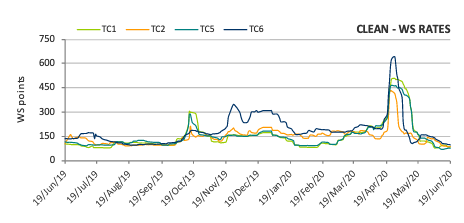The recession currently underway globally is bound to have a negative impact on demand for ships. However, the scale of the recovery will also be key for the shipping industry, as some countries will bounce back quicker than others. Which ones will manage to do this, could be key for shipping. “The World Bank estimates that the global economy will fall by 5.2% this year, underlining that the Covid-19 pandemic has had rapid and massive consequences despite the implementation of unprecedented programs to support local economies”, Intermodal said in its latest weekly report.
According to Intermodal’s SnP Broker, Mr. Zisis Stylianos, “in its report on the Global Economic Outlook the World Bank points out that in the developed economies the decline will be in the order of 7%, while in emerging ones 2.5%. This is the deepest recession the planet has known since World War II, and 70 to 100 million people may find themselves below the poverty line. This revised forecast shows that the damage to the global economy will be worse than estimated in April by the International Monetary Fund that estimated a global contraction of 3% for 2020. China has announced it will not set a growth target for 2020, as the country will focus on stabilizing employment and ensuring the living standards of its citizens”.
The shipbroker added that “while addressing the 13th National People’s Congress, China’s Prime Minister, Li Keqiang, said the decision not to set a development goal was related to the uncertainty caused by the Covid-19 pandemic. According to the report shared at the conference, China will focus on maintaining security in the financial sector, foreign trade, foreign investment and domestic investment. The report also listed six areas the world’s second-largest economy should focus on, namely; job security, basic living needs, the functioning of market bodies, food and energy safety, stable industrial and supply chains and the normal functioning of first-level functions”.
Stylianos also noted that “in the oil sector, the U.S. government is seeking to put an end to oil exports, Venezuela’s main source of revenue, in order to weaken President Nicolas Maduro government. It may even extend its sanctions to a dozen more tankers. So many oil companies are reviewing their plans to charter tankers found in Venezuela over the past twelve months. According to Reuters, Chinese oil companies may soon cease chartering any tanker that arrived in Venezuela during the last year. The aim is to avoid blacklisting if the US decides to impose sanctions on more ships that engage in commercial activities with Caracas”.
“As far as the dry bulk sector is concerned, we are witnessing a very impressive increase in the BDI index in the past two weeks, with the strong momentum pushing the index above the 1500 points barrier. It is worth noting that on June 1st the BDI closed at 520 points and the Capesize index at 82 points with average daily earnings for the big bulkers at $ 3,648/day. Within 15 days both the BDI and BCI increased by more 139% 2,893% respectively, while the average daily fare of Capes went up by 448.9%. Based on the positive market sentiment and the momentum that is inspiring it, the recovery of the ground lost in the past months appears to be even closer now”, Intermodal’s analyst concluded.
Source: Hellenic Shipping News





